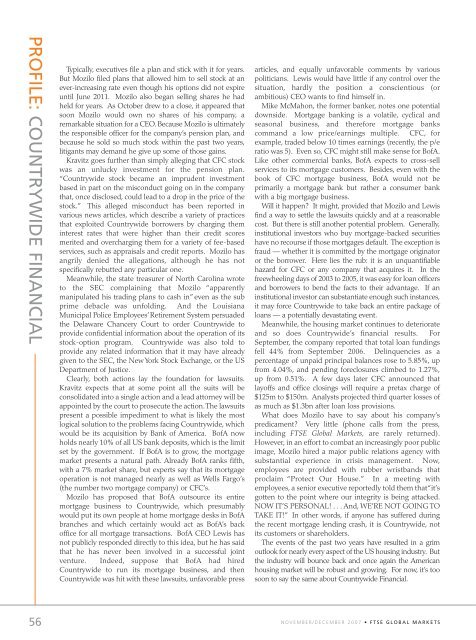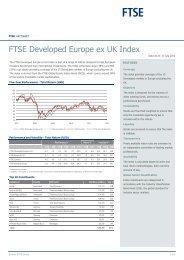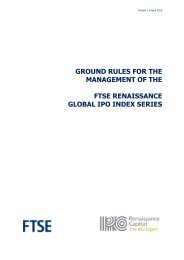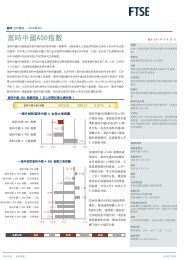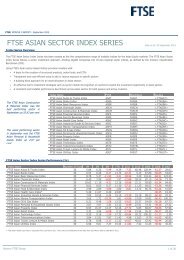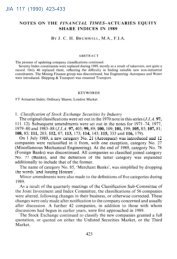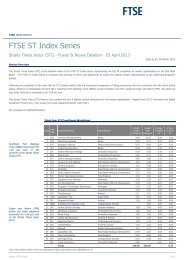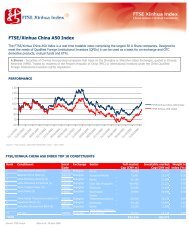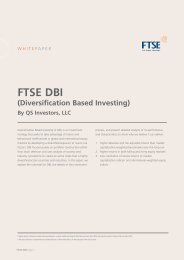Section 2 - FTSE
Section 2 - FTSE
Section 2 - FTSE
Create successful ePaper yourself
Turn your PDF publications into a flip-book with our unique Google optimized e-Paper software.
PROFILE: COUNTRYWIDE FINANCIAL<br />
56<br />
Typically, executives file a plan and stick with it for years.<br />
But Mozilo filed plans that allowed him to sell stock at an<br />
ever-increasing rate even though his options did not expire<br />
until June 2011. Mozilo also began selling shares he had<br />
held for years. As October drew to a close, it appeared that<br />
soon Mozilo would own no shares of his company, a<br />
remarkable situation for a CEO. Because Mozilo is ultimately<br />
the responsible officer for the company’s pension plan, and<br />
because he sold so much stock within the past two years,<br />
litigants may demand he give up some of those gains.<br />
Kravitz goes further than simply alleging that CFC stock<br />
was an unlucky investment for the pension plan.<br />
“Countrywide stock became an imprudent investment<br />
based in part on the misconduct going on in the company<br />
that, once disclosed, could lead to a drop in the price of the<br />
stock.” This alleged misconduct has been reported in<br />
various news articles, which describe a variety of practices<br />
that exploited Countrywide borrowers by charging them<br />
interest rates that were higher than their credit scores<br />
merited and overcharging them for a variety of fee-based<br />
services, such as appraisals and credit reports. Mozilo has<br />
angrily denied the allegations, although he has not<br />
specifically rebutted any particular one.<br />
Meanwhile, the state treasurer of North Carolina wrote<br />
to the SEC complaining that Mozilo “apparently<br />
manipulated his trading plans to cash in” even as the sub<br />
prime debacle was unfolding. And the Louisiana<br />
Municipal Police Employees’Retirement System persuaded<br />
the Delaware Chancery Court to order Countrywide to<br />
provide confidential information about the operation of its<br />
stock-option program. Countrywide was also told to<br />
provide any related information that it may have already<br />
given to the SEC, the New York Stock Exchange, or the US<br />
Department of Justice.<br />
Clearly, both actions lay the foundation for lawsuits.<br />
Kravitz expects that at some point all the suits will be<br />
consolidated into a single action and a lead attorney will be<br />
appointed by the court to prosecute the action.The lawsuits<br />
present a possible impediment to what is likely the most<br />
logical solution to the problems facing Countrywide, which<br />
would be its acquisition by Bank of America. BofA now<br />
holds nearly 10% of all US bank deposits, which is the limit<br />
set by the government. If BofA is to grow, the mortgage<br />
market presents a natural path. Already BofA ranks fifth,<br />
with a 7% market share, but experts say that its mortgage<br />
operation is not managed nearly as well as Wells Fargo’s<br />
(the number two mortgage company) or CFC’s.<br />
Mozilo has proposed that BofA outsource its entire<br />
mortgage business to Countrywide, which presumably<br />
would put its own people at home mortgage desks in BofA<br />
branches and which certainly would act as BofA’s back<br />
office for all mortgage transactions. BofA CEO Lewis has<br />
not publicly responded directly to this idea, but he has said<br />
that he has never been involved in a successful joint<br />
venture. Indeed, suppose that BofA had hired<br />
Countrywide to run its mortgage business, and then<br />
Countrywide was hit with these lawsuits, unfavorable press<br />
articles, and equally unfavorable comments by various<br />
politicians. Lewis would have little if any control over the<br />
situation, hardly the position a conscientious (or<br />
ambitious) CEO wants to find himself in.<br />
Mike McMahon, the former banker, notes one potential<br />
downside. Mortgage banking is a volatile, cyclical and<br />
seasonal business, and therefore mortgage banks<br />
command a low price/earnings multiple. CFC, for<br />
example, traded below 10 times earnings (recently, the p/e<br />
ratio was 5). Even so, CFC might still make sense for BofA.<br />
Like other commercial banks, BofA expects to cross-sell<br />
services to its mortgage customers. Besides, even with the<br />
book of CFC mortgage business, BofA would not be<br />
primarily a mortgage bank but rather a consumer bank<br />
with a big mortgage business.<br />
Will it happen? It might, provided that Mozilo and Lewis<br />
find a way to settle the lawsuits quickly and at a reasonable<br />
cost. But there is still another potential problem. Generally,<br />
institutional investors who buy mortgage-backed securities<br />
have no recourse if those mortgages default. The exception is<br />
fraud — whether it is committed by the mortgage originator<br />
or the borrower. Here lies the rub: it is an unquantifiable<br />
hazard for CFC or any company that acquires it. In the<br />
freewheeling days of 2003 to 2005, it was easy for loan officers<br />
and borrowers to bend the facts to their advantage. If an<br />
institutional investor can substantiate enough such instances,<br />
it may force Countrywide to take back an entire package of<br />
loans — a potentially devastating event.<br />
Meanwhile, the housing market continues to deteriorate<br />
and so does Countrywide’s financial results. For<br />
September, the company reported that total loan fundings<br />
fell 44% from September 2006. Delinquencies as a<br />
percentage of unpaid principal balances rose to 5.85%, up<br />
from 4.04%, and pending foreclosures climbed to 1.27%,<br />
up from 0.51%. A few days later CFC announced that<br />
layoffs and office closings will require a pretax charge of<br />
$125m to $150m. Analysts projected third quarter losses of<br />
as much as $1.3bn after loan loss provisions.<br />
What does Mozilo have to say about his company’s<br />
predicament? Very little (phone calls from the press,<br />
including <strong>FTSE</strong> Global Markets, are rarely returned).<br />
However, in an effort to combat an increasingly poor public<br />
image, Mozilo hired a major public relations agency with<br />
substantial experience in crisis management. Now,<br />
employees are provided with rubber wristbands that<br />
proclaim “Protect Our House.” In a meeting with<br />
employees, a senior executive reportedly told them that “it’s<br />
gotten to the point where our integrity is being attacked.<br />
NOW IT’S PERSONAL! . . . And, WE’RE NOT GOING TO<br />
TAKE IT!” In other words, if anyone has suffered during<br />
the recent mortgage lending crash, it is Countrywide, not<br />
its customers or shareholders.<br />
The events of the past two years have resulted in a grim<br />
outlook for nearly every aspect of the US housing industry. But<br />
the industry will bounce back and once again the American<br />
housing market will be robust and growing. For now, it’s too<br />
soon to say the same about Countrywide Financial.<br />
NOVEMBER/DECEMBER 2007 • <strong>FTSE</strong> GLOBAL MARKETS


